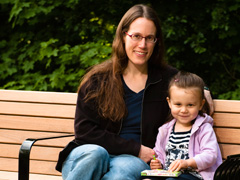Meeting Competing Demands
By Jim Oldfield
A friend of Wendy Oakden's recently asked her advice: should she, as the mother of two young children, embark on PhD studies? Oakden, mother of a two-year-old daughter and a second-year doctoral student, was blunt. "Don't get started with two kids, one of them very young," said Oakden. "Wait a couple of years."
For Oakden, a University of Toronto medical biophysics student in the lab of Dr. Greg Stanisz, Sunnybrook Research Institute (SRI) senior scientist and U of T associate professor, this anecdotal conspiracy of twos is not a tale of regret, but rather one of caution. It speaks to the intense difficulty of parenting young kids while pursuing a career in the results-driven realm of medical science.
Extended time off to care for kids is not an option for many graduate students and fellows: at U of T, they get about four months' paid leave, if their supervisors consent to it. They're strapped financially even before having children. Then there's the worry of scientific "scoopmanship," as promising projects left undeveloped may mean others will publish results first, nabbing academic kudos and the funding that can flow from them.
Pressed on multiple fronts, students and postdocs need strategies for the work-family mix. One is adapting to schedule changes.
For Oakden, who habitually worked late before she had her daughter because she found evenings productive, a new approach to scheduling became essential. Daycare at Sunnybrook Crèche, where it took 18 months to get a placement—"daycare spaces are a big problem in Toronto," she says—meant making her work schedule 9 a.m. to 5 p.m.
Learning to be productive during those daytime hours was a challenge. Focusing at work demanded greater concentration, and a more defined work schedule required better planning of her research activities. All that while sleep-deprived—her daughter was unusually active, and rarely slept more than eight hours a night.
Dr. Mahmood Mohtashami, father of a three-year-old daughter and a postdoctoral fellow at SRI in the lab of senior scientist and U of T professor Dr. Juan Carlos Zúñiga-Pflücker, also reworked his schedule; but the result, in contrast, was more unconventional hours. Though he no longer works most weekends, Mohtashami (whose daughter receives care from a live-in nanny, thereby enabling flexibility in the hours he and his wife work) sometimes returns to the lab late at night once his family is sleeping.
Despite this measure, Mohtashami spends less time at work since his daughter's birth, and so feels a need to be more efficient while he's there. He therefore takes fewer breaks, spends less time socializing with colleagues and often avoids a lunch break. He still feels awkward about his hours, given the time postdocs are expected to spend working, but says, "I am doing more in less time."
Mohtashami and Oakden wouldn't be in a position to make these organizational adjustments, however, did they not work for empathetic scientists. Zúñiga-Pflücker, a father of two, doesn't question Mohtashami's hours. Stanisz, also a father of two, has been very accommodating, according to Oakden, and gave her a generous six-month maternity leave. "I can't imagine doing this if my supervisor didn't have kids," she says.
PDF / View full media release »





